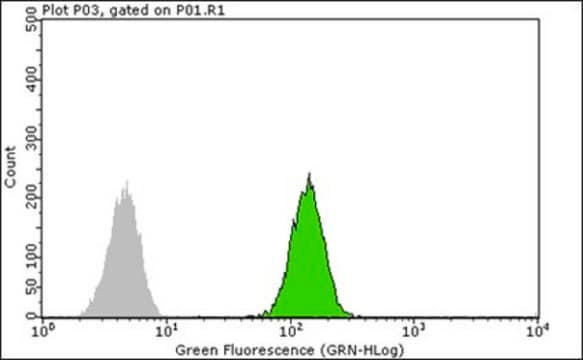04-1466
Anti-SMN Antibody, clone 62E7
clone 62E7, from mouse
Sinónimos:
Component of gems 1, gemin 1, spinal muscular atrophy (Werdnig-Hoffmann disease, Kugelberg-Welander disease), survival of motor neuron 1, telomeric
About This Item
Productos recomendados
biological source
mouse
Quality Level
antibody form
purified immunoglobulin
antibody product type
primary antibodies
clone
62E7, monoclonal
species reactivity
human
species reactivity (predicted by homology)
mouse, Xenopus
technique(s)
immunocytochemistry: suitable
immunoprecipitation (IP): suitable
western blot: suitable
isotype
IgG1κ
NCBI accession no.
UniProt accession no.
shipped in
wet ice
target post-translational modification
unmodified
Gene Information
human ... SMA4(11039)
General description
Specificity
Immunogen
Application
Epigenetics & Nuclear Function
RNA Metabolism & Binding Proteins
Quality
Western Blot Analysis: 0.5 µg/ml of this antibody detected SMN on 10 µg of HeLa cell lysate.
Target description
Physical form
Storage and Stability
Analysis Note
HeLa cell lysate
Other Notes
Disclaimer
¿No encuentra el producto adecuado?
Pruebe nuestro Herramienta de selección de productos.
Storage Class
12 - Non Combustible Liquids
wgk_germany
WGK 1
flash_point_f
Not applicable
flash_point_c
Not applicable
Certificados de análisis (COA)
Busque Certificados de análisis (COA) introduciendo el número de lote del producto. Los números de lote se encuentran en la etiqueta del producto después de las palabras «Lot» o «Batch»
¿Ya tiene este producto?
Encuentre la documentación para los productos que ha comprado recientemente en la Biblioteca de documentos.
Nuestro equipo de científicos tiene experiencia en todas las áreas de investigación: Ciencias de la vida, Ciencia de los materiales, Síntesis química, Cromatografía, Analítica y muchas otras.
Póngase en contacto con el Servicio técnico








